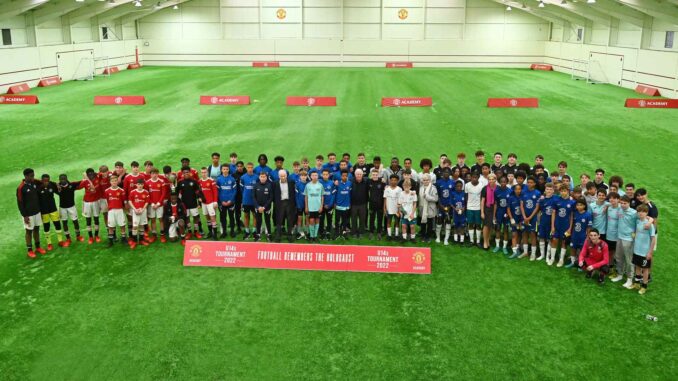
[ad_1]
Cahill explains that this is one very important part of a wider informal education programme at United, which includes projects on club history – mainly the Munich Air Disaster – and on ‘Trailblazers of Football’, which looked at the first black player to represent United and celebrated the mixed heritage of players who have made up our first team over the years.
“These projects are imperative to the development of our players as we use the power of football to engage them in important historical events, none more so than the Holocaust event,” Cahill said.
“We found a great blend of football and education with both complementing each other perfectly. The boys showcased their football capabilities in a high-level competition whilst also showcasing their pride in the educational work they have done throughout the year as they presented chosen topics to invited guests.
“The clubs worked together to deliver the overall project, and all pledged to pass it on and continue the messages learned. Having Manchester City, Chelsea and Brighton involved was excellent and we are grateful to them for making the effort to join us both for the opening meal on Sunday and the tournament on Monday. We were also joined by Maccabi GB as they continued preparations for the World Maccabiah Games in Israel this summer. We were privileged to have them with us as we showcased the learning of Academy players on such an important topic.”
ESCAPING NAZISM
In 1939, Harry Kessler’s chance meeting with an English woman speaking halting German in Vienna led to the great accidental happening of a lifetime.
“We needed to get away from Czechoslovakia,” he recalls.
“We needed not only a lot of documents locally, which my parents got, but also an affidavit from somebody in the country we were going to, saying that they would take full financial responsibility for us.
“We didn’t know anybody, anywhere. My father was going through his desk and found this letter, from the lady in 1934 thanking us. And so, he wrote to the Joneses, they sent us the affidavit that we needed, and we were able to get away. We lived with them for a year after we came to England.
“The two main lessons I hope you learn from my story is that kindness to strangers is a wonderful thing, and, of course, to have tolerance of everybody.”
Milena Grenfell-Baines’s arrival in the UK was not accidental, but was also through an act of kindness by a stranger. Aged nine, she and her three-year-old sister Eva were the beneficiaries of the work of Nicholas Winton and those who bravely assisted him.
Her father, Rudolf Fleischmann, had fled Czechoslovakia the day before the Nazi invasion in March 1939. He had been a supporter of famous anti-Nazi author Thomas Mann, and was Jewish. Milena’s mother Sonia later escaped via Norway.
Milena and her sister left alone on trains to England. They had been told they could not cry, and they did not. They arrived at London’s Liverpool Street station, and were met by the Radcliffes, who looked after them in Ashton-under-Lyne until their own family was reunited a year later.
Like Harry, Tomi and thousands of other survivors, Milena forged a life in the UK. She ran a catering college in Preston, organising exchanges with Czech students, and acted as an interpreter and tour guide for the Czech Republic national football team in 1996 during England’s European Championships. When Karol Poborsky joined United soon after the tournament, Milena helped him and his partner to settle into Mancunian life.
[ad_2]
Source link
Leave a Reply